

Education for the 4th Industrial Revolution. Education 4.0 – transforming the future of education (through advanced technology) Artificial intelligence & the future of education systems. The Changing Role of School Librarians. Divergent Thinking. Sir Ken Robinson - Revolutionizing Education from the Ground Up. RSA Animate - Changing Education Paradigms.
SMART kapp iQ – A Magical Story. Playing and Staying Safe Online. Transforming the Classroom with iPads. 10 Ways Edtech Tools Can Facilitate the Teaching and Learning Process. 3 Ways Mobile Technology Boosts Instruction. How to Teach a Room of Digital Natives. Artificial Intelligence: Are Computers Taking Over for Teachers? 7 Ways That Digital Technology is Changing the Face of Education. Schools must get the basics right before splashing out on technology. 5 Things You Should Know About Adaptive Learning.
Beyond the Bubble Test: Why We Need Performance Assessments - Education Futures: Emerging Trends in K-12. Note: Today's guest blogger needs no introduction.
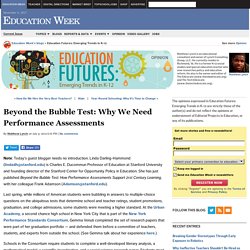
Linda Darling-Hammond (lindadh@stanford.edu) is Charles E. Ducommun Professor of Education at Stanford University and founding director of the Stanford Center for Opportunity Policy in Education. She has just published Beyond the Bubble Test: How Performance Assessments Support 21st Century Learning, with her colleague Frank Adamson (Adamson@stanford.edu).
Last spring, while millions of American students were bubbling in answers to multiple-choice questions on the ubiquitous tests that determine school and teacher ratings, student promotions, graduation, and college admissions, some students were meeting a higher standard. Schools in the Consortium require students to complete a well-developed literary analysis, a mathematical model, a scientific investigation, and a social science research paper. In science, Gemma conducted and wrote up an experiment about the Effect of Stress on Memory. The contrast with other countries is stark. An Introduction to Technology Integration. What is Visual Literacy? What does it mean to be an inquiry teacher? Inquiry-Based Learning: From Teacher-Guided to Student-Driven.
STEAM + Project-Based Learning: Real Solutions From Driving Questions. Project-Based Learning at Clear View Charter Elementary School (Learn and Live) Introducing The Flipped Classroom. Sugata Mitra: The Future of Learning. Sir Ken Robinson's Education Revolution - Animation. Sir Ken Robinson Discusses the Role of Technology in Education. Peter Gray - Self-Directed Learning Fundamentals. A Vision for the Learner in 2050. The Classroom of 2030. Classroom of the Future at Chimo Elementary. Framework for 21st Century Learning. 15 Characteristics of a 21st-Century Teacher.
Recent technological advances have affected many areas of our lives, including the way we communicate, collaborate, learn, and, of course, teach.
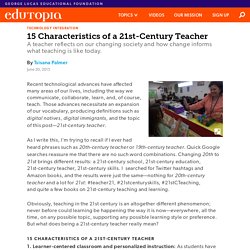
Those advances necessitate an expansion of our vocabulary, producing definitions such as digital natives, digital immigrants, and the topic of this post—21st-century teacher. As I write this, I’m trying to recall if I ever had heard phrases such as 20th-century teacher or 19th-century teacher. Quick Google searches reassure me that there are no such word combinations. Changing 20th to 21st brings different results: a 21st-century school, 21st-century education, 21st-century teacher, 21st-century skills. I searched for Twitter hashtags and Amazon books, and the results were just the same—nothing for 20th-century teacher and a lot for 21st: #teacher21, #21stcenturyskills, #21stCTeaching, and quite a few books on 21st-century teaching and learning. 15 Characteristics of a 21st-Century Teacher 1. 2. 3. 4. 5. 6. 7. 8. 9. 10. 11. 12. 13. 14. 15.
20 Ways to Transform Learning with Technology! On Demand Learning in the 21st Century Classroom. 3 Steps to 21st Century Learning and Student Success. GIving children a VOICE!!! 21st Century Teachers Must be 21st Century Learner. Singapore's 21st-Century Teaching Strategies (Education Everywhere Series) The Four C's: Making 21st Century Education Happen. Teaching for 21st Century. Rethinking Learning: The 21st Century Learner. Searching the Web - Advanced - Atomic Learning. An Overview of Learning Methodologies - Atomic Learning. Integrating the 4 Cs into Your Classroom.
This is a module of trainings designed to show how technology can be used to foster the 21st Century Skills of Collaboration, Communication, Critical Thinking, and Creativity.
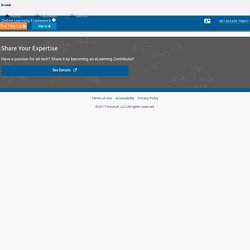
Although specific technologies are highlighted, there are hundreds more that are just as good that could be used for the same purposes! By the end of this learning module, the learner will be able to: Define the 4 Cs of 21st Century Skills. Understand how various technologies can foster these skills with your students. Evaluate and implement technologies to foster these skills in your classroom. Google is a trademark of Google. Project-Based Learning. Over time, the world of public education has grown increasingly difficult, for both students and teachers.
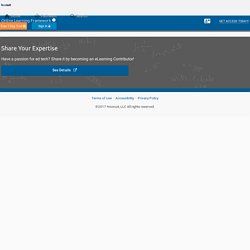
Its focus has drifted from applicable, relevant instruction to test performance and attainment of standards. At times, the prognosis can seem bleak. Adapting a 21st Century Skills Project to the Classroom - Atomic Learning. 21st Century Skills Concepts. What is meant by "21st Century Skills?
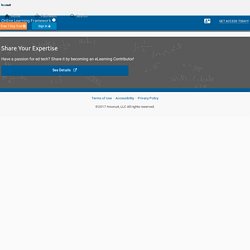
" How do they relate to what I should be teaching in my classroom? These are just some of the questions that you might be asking when you hear the term "21st Century Skills. " In this series of tutorials, we will present what we mean by the terminology and how it relates to the models, frameworks, and technology standards that have been developed by other organizations. After viewing each of the tutorials, we hope you will be able to answer: What are the common themes and concepts that tie all the models, frameworks, and technology standards together?